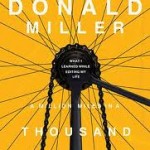 Over the past decade, few books have had the impact on the art of Story than Donald Miller’s A Million Miles in a Thousand Years. He doesn’t simply speak about story, he challenges himself and others to live a better story…a story that could change everything. As you can imagine, Don is paying me thousands of dollars and is going to write a review of my book to pay me back for this post as he sees it as being the exposure that will jump start his career. (oh wait, that MIGHT not be true…).
Over the past decade, few books have had the impact on the art of Story than Donald Miller’s A Million Miles in a Thousand Years. He doesn’t simply speak about story, he challenges himself and others to live a better story…a story that could change everything. As you can imagine, Don is paying me thousands of dollars and is going to write a review of my book to pay me back for this post as he sees it as being the exposure that will jump start his career. (oh wait, that MIGHT not be true…).
With endless books to read for seminary, I hadn’t had the opportunity to read this book until a couple months ago when I had a couple days without a textbook to tackle. This is super rough and unedited, but as soon as I was done, I slapped down the cliff notes. Hopefully they are clear enough to give a glimpse into his main points!
Ways to respond:
1. If you have already read the book, add a comment on some aspect of the book I didn’t include (there are lots) so we get a better picture of his direction
2. If you haven’t read the book, go buy or borrow a copy!
Donald Miller seeks to articulate that each person’s life tells a story. With each decision we make and action we take, we decide wha t kind of story we will tell with our lives. Further, our story is not just for our personal good, it will influence others. Either it will affirm their belief in the American dream of consumption and laziness or it will ignite in them the desire to seek out an adventure as one’s created to participate in the unfolding Story of God.
t kind of story we will tell with our lives. Further, our story is not just for our personal good, it will influence others. Either it will affirm their belief in the American dream of consumption and laziness or it will ignite in them the desire to seek out an adventure as one’s created to participate in the unfolding Story of God.
Fear can paralyze us from taking actions that will advance our stories for our own good and the good of others. Don uses the story of meeting his father as his driving illustration.
Good stories will NEVER be easy. In fact, there will be times where the conflict (he uses the term “Inciting Incident” – see his bike trip or hike to Macchu Pichu) seems too great to overcome. We can jump out of the “kayak” and sink to the bottom of the ocean in search of a new/easier story or we can continue forward and allow our “character” to fully develop into who it is we are created to be. Don continues by saying that the reward at the end of such a journey is never as good as we think it will be…but that is not the point. The end/reward is not what develops our character; it is the “character arc” or the adventure that leads us to the end. Don uses the family that stays together (specifically the father that sticks around) through difficult, nearly hopeless times, as his driving charge towards the reader.
When our story begins to not only achieve self actualization and fulfillment, but the story we tell with our lives impacts the good of others, our life as the potential to become an “epic.” An epic requires that the main characters life is at risk and overcomes huge obstacles time and time again for the benefit of others. Don uses The Mentoring Project as his illustration for his life becoming and “epic.”
In the end, our story can never fully tell the story of God. No, that can only be told when Jesus returns and makes all things right…When heaven is fully realized and we sit at the wedding feast with Jesus. Don consistently used the examples of “funeral” and “wedding” as symbols of life and death. So it is in heaven, when we fully experience life that we will be at the “wedding” with Jesus.